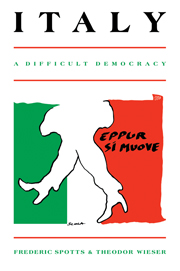Book contents
- Frontmatter
- Contents
- Preface
- Map of Italy showing regional borders and capitals
- 1 The political context
- 2 The Christian Democrats: The indispensable center?
- 3 The Communists' struggle for legitimacy and acceptance
- 4 The ambiguous role of the Socialists
- 5 The small parties: The lay forces and the extremes
- 6 Parliament, prime minister, and president
- 7 Public administration and sottogoverno
- 8 The administration of justice
- 9 Dangers to the state: Plots, terrorism, and the mafia
- 10 Economic and social transformation
- 11 Regional devolution and the problem of the South
- 12 The changing relations between church and state
- 13 Foreign and security policy
- 14 “But it does move” – a summing up
- Appendixes
- Bibliography
- Index
13 - Foreign and security policy
Published online by Cambridge University Press: 03 May 2010
- Frontmatter
- Contents
- Preface
- Map of Italy showing regional borders and capitals
- 1 The political context
- 2 The Christian Democrats: The indispensable center?
- 3 The Communists' struggle for legitimacy and acceptance
- 4 The ambiguous role of the Socialists
- 5 The small parties: The lay forces and the extremes
- 6 Parliament, prime minister, and president
- 7 Public administration and sottogoverno
- 8 The administration of justice
- 9 Dangers to the state: Plots, terrorism, and the mafia
- 10 Economic and social transformation
- 11 Regional devolution and the problem of the South
- 12 The changing relations between church and state
- 13 Foreign and security policy
- 14 “But it does move” – a summing up
- Appendixes
- Bibliography
- Index
Summary
The maxim that every country seeks power, security, and glory has remarkably little application to Italy. Almost all Italians, political leaders and public alike, take for granted that their country has no appreciable role to play in international affairs and would be mistaken and frustrated if it tried to do so. They lack any desire to assert Italian influence in the world and feel little concern for their military safety. Even though Italy has a population of 57 million, lies in a strategic location, and has an economy among the world's largest, it takes a minor part in world politics. Italian diplomats and scholars not surprisingly complain that their country's foreign relations are singularly lacking in force, direction, and substance. Indeed, after forty-four years in the diplomatic service one of Italy's most distinguished ambassadors, Pietro Quaroni, concluded: “An Italian foreign policy in the real sense of the word does not exist.”
In large part this withdrawal from the world is a natural reaction to the ignominy of Mussolini's foreign adventures and the inevitable consequence of a lost war. West Germany and Japan are also unwilling to occupy the role in international affairs to which economics and geopolitics would objectively entitle them. But the Italian diffidence is deeper and older. Ultimately it can be traced to the centuries of political division and foreign – as well as papal – meddling in the country's development.
- Type
- Chapter
- Information
- ItalyA Difficult Democracy: A Survey of Italian Politics, pp. 263 - 282Publisher: Cambridge University PressPrint publication year: 1986
- 1
- Cited by



